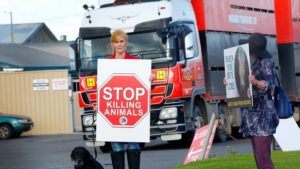 The recent actions by Australian animal rights activists have caused a stir.
The recent actions by Australian animal rights activists have caused a stir.
Commemorating the first anniversary of the Dominion movie, the protesters blocked a major intersection in Melbourne. Some chained themselves to vans advertising the web address of the film, which depicts hidden footage of animal agriculture atrocities.
They caused quite a jam. And it was even more of a pickle in Queensland when activists entered slaughterhouses, and keeping up with the chain theme, locked themselves on to equipment.
The activists have upset the apple cart, and now people have got beef with them. Meat-eating Australians have taken to social media with pictures of their meat meals and hashtags such as #veganterrorists.
Of course they have. It is called deflection.
In Australia, as in New Zealand and elsewhere, the animal agriculture industry terrorises millions of animals as a matter of routine. They hold them in detention camps, brand them, breed from them, kill their offspring, and milk them.
Then they are sent off to be gassed in chambers (if you are a pig) or stunned and bled out with a knife stuck in your throat (for bovines, goats and lambs). If you are a chicken, it is even worse. You get to hang upside down with your feet shackled while being dumped in a tub of electrified water.
Did the activists in Australia really terrify a nation by halting the traffic?
Let’s bring some clarity to this absurd accusation of terrorism. Did the activists in Australia really terrify a nation by halting the traffic? Was it, as the Australian Prime Minister suggests, a shameful and un-Australian act? Is disturbing a morning commute terrorism?
It is my opinion that the activists were doing a very un-terrorist thing (if the Prime Minister of Australia can say un-Australian, then I am going to say un-terrorist). A democratic society allows for a rich diversity of views and the freedom to express them and protest peacefully. We cannot progress socially without social critique – and activists provide us with another window into a possible world.
People fear change. It is far easier to put activists in a box and call them terrorists than it is to really examine the immoral systems at that basis of animal agriculture.
Many people are also wary of diversity, and any views that challenge the status quo. Our legal systems embrace speciesist views of the world, which ensures that anyone who steps outside this narrow worldview is branded extreme. Animal Rights activists do unsettle people’s views on the world – and that is a good thing (and not a terrorist thing).
If no one ever challenged the status quo then women would still not have the vote and legally be the property of men.
One of the ideas in animal rights activism that many people struggle with is the assertion that distinguishing between species is similar to sexism or racism. Speciesism is the ideology that human lives are exceptional and that the interests of animals should be subordinated to those of humans. This way of thinking serves to justify cruelty to trillions of animals per year whose lives are surrendered in pursuit of profits.
When fear, intolerance and speciesism become cemented in law it has extreme repercussions on the freedom to protest and agitate for progressive social change. In America, for example, there is a law called the Animal Enterprise Terrorism Act. This act has given authorities the power to convict animal rights activists of terrorism.
At the base of these kind of laws is the protection of financial interests. Those who make a living out of animal bodies don’t want to be challenged.
Speciesism is very visible in our society – yet we can’t see it because we have been socialised to normalise it. The way we routinely treat most animals in society sends a very clear message that we have the right to dominate animals and do whatever we like with them.
A nation that truly celebrates difference would also respect the diverse life forms we share the planet with. I would like to see the ethics of speciesism debated at every level, including by politicians and educators.
One person’s terrorist is another pig’s hero. It’s all a matter of perspective. From the pig’s point of view, as he walks the green mile to the gas chamber, I know who his heroes are.
And I know who terrorises him.

